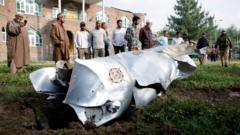India accuses Pakistan of harboring terrorist groups responsible for attacks in Kashmir, heightening tensions in a region already fraught with conflict. Pakistan denies the allegations, claiming such organizations have been outlawed.
Escalating Tensions: India and Pakistan’s Clash over Terrorism Claims

Escalating Tensions: India and Pakistan’s Clash over Terrorism Claims
Recent violence in Kashmir has rekindled strife between India and Pakistan, with accusations and denials surrounding terrorist organizations.
The recent outbreak of conflict between India and Pakistan has reignited concerns over terrorism and national security in the troubled region of Kashmir. Following a deadly attack on civilians, where 26 men, predominantly Hindus, were killed by militants, the Indian government has pointed to Pakistan-based terrorist organizations as the brains behind the assault. This incident marks one of the most significant escalations in hostilities between the two countries in decades.
Witnesses report that a group of militants, operating under the name “Resistance Front,” ambushed people enjoying a serene day at a popular picnic site, targeting individuals based on their religion before their families. The Indian government quickly attributed the group's activities to the broader network of terrorists it claims operates from Pakistan; however, Pakistan has wholly rejected these assertions.
India has specifically focused its accusations on two major groups: Lashkar-e-Taiba (LeT) and Jaish-e-Muhammad (JeM). The former, established in the 1980s, has a long history of conducting brutal attacks in India and was placed under UN sanctions in 2005 for its violent activities. One of its notorious attacks occurred in 2008 during the Mumbai terror incident, which claimed over 160 lives and brought international scrutiny to Pakistan's links with terrorism.
While Pakistan admits that Lashkar-e-Taiba has been involved in past violence, it asserts that the organization has been disbanded and outlawed. Pakistani authorities maintain that the group’s founder, Hafiz Saeed, has had limited periods of detention, and they argue that any continued operations are now routed through different fronts or splinter groups. Indian officials contend that groups like the Resistance Front are just surfaces of an ongoing strategy to destabilize India.
The conflicting narratives between India and Pakistan root themselves deeply in historical grievances and mutual mistrust, complicating the path toward resolution and peace in the Kashmir region. As both nations continue to grapple with these accusations and defend their respective positions, the prospect of reconciliation appears increasingly distant.



















